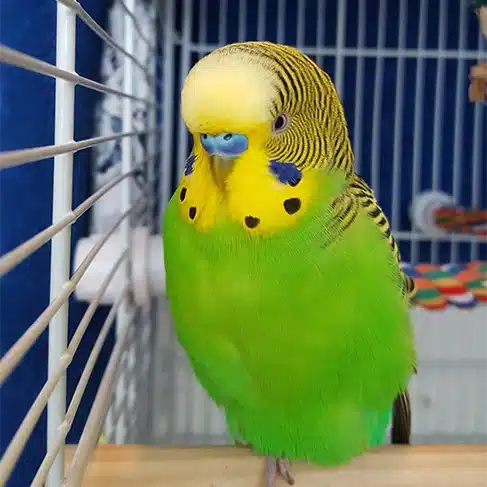The most important thing to maintain about your budgies is their food and diet. The next most important thing is to ensure they get a sound sleep every day. So, how long do budgies sleep?
Budgies should sleep for 10 to 12 hours per day. Since they are diurnal birds, they will have the most of it at night. And they will compensate for the rest by taking naps during the daytime.
As you rightly guessed, I am here today to discuss your budgies’ sleeping needs. So, let’s start.
How Long Do Budgies Sleep?
Budgies require 10 to 12 hours of sleep each day. And most of it should be at night. That does not mean they sleep at a stretch. They will wake up twice or thrice and get up at sunrise.
For example, if they sleep 8 hours at night, they will make up for the remaining 2 to 4 hours by taking several naps in the day. Each nap should be 30 to 45 minutes long.
It may sound too much to some, but it is vital for budgies’ health. They consume around 50 to 130 calories every day. The metabolization takes place immediately, causing a quick energy burn.
So, when their energy level declines, their functioning slows down, making them exhausted. A sound sleep will heal their body and top up their energy.
It is a must for them to sleep for a minimum of 10 hours to maintain a healthy immune system. Otherwise, they will become weak and susceptible to diseases.
Does The Sleeping Duration Vary With Age?
Yes. Like other animals, budgies require more rest and sleep as they grow.
On average, captive budgies have a lifespan of 8 to 10 years. So, most budgies step into their middle age when they are 5 years old.
Do not get me wrong. You do not have to start worrying from the day your budgies turn 5. They will not stop interacting and start dozing off immediately. Healthy budgies should stay active and playful regardless of their age.
That said, it will naturally require the older ones to relax more to regain their energy.
What Are The Ideal Time And Environment For Budgies To Sleep?
6-PM is the ideal time for your budgies to sleep. If you place the cage under a blanket, they will get prepared to sleep during this time.
Use a blanket to cover the cage, and ensure there is no external noise. It will irritate and scare them, taking their precious sleep away.
Besides, the ideal sleeping environment should have no presence of light. At best, a dim light will do. High light exposure during sleeping can create behavioral issues and make your budgies prone to various illnesses.
It can even result in egg-laying, where the female budgie uses nutrients from her body to make eggs. However, the eggs will not be fertilized. Yet, meanwhile, the budgie will lose valuable vitamins and become weak.
You may need to switch on the lights to stay up sometimes. But if it continues, it will affect your budgies’ health negatively.
How Can I Prepare the Cage For My Budgies to Sleep Well?
It should have many perches if you have several budgies in a single cage. That will mitigate their tendency to fight over perches. Note that territorial aggression is common in budgies.
Lack of perches will make them attack each other, disrupt the harmony of their environment, and disturb their sleeping pattern.
Does The Temperature Affect Budgies’ Sleep?
Yes, cold temperatures significantly affect budgies’ sleep and cause illness. As budgies are tropical birds, they prefer warm temperatures.
So, the placement of their cage should have a temperature ranging from 21 degrees to 24 degrees Celsius.
If you keep your budgies outdoors, bring them inside during the winter. It is essential for their health and sleep altogether.
Signs Your Budgies Are Having Trouble Sleeping
There will be some changes in your budgies’ behavior if they have trouble sleeping. The table contains 4 signs with brief explanations.
| Signs your budgies are not sleeping enough! | Explanations |
| Aggressive behavior | They will lose their natural cheerfulness and stop engaging in activities or with their owner |
| Laziness | It will become lethargic and tired. That can lead to depression in the long run |
| Tendency to fight | The cranky mood will make them hostile toward each other |
| Frequent sickness | Their immunity system will become weak |
Let’s get down to the deets now.
1. Aggressive Behavior
Sleep deprivation makes budgies unusually aggressive. I remember one of my budgies stopped playing with me. Instead, it used to get hostile when I tried to go near it during meal times.
Other behaviors include squawking during odd hours, destroying perches and toys, and bickering at other budgies. In such times, you need to determine what is wrong with their sleeping environment and fix it soon.
2. Laziness
An underslept budgie will become lazy and decrease its activities. It may also try to sleep more during the day.
I already mentioned that daytime naps are normal between activities. They are usually more than half an hour and less than an hour.
However, if your budgies seem to sleep longer in the day, it may be because they cannot sleep well at night. Such signs are not healthy for their sustainability.
A prolonged lifestyle like that will cause depression, where they gradually stop taking food and water. If they go an entire day without eating, they will need immediate medical attention.
3. Tendency To Fight
We know that budgies often fight playfully. Sometimes that goes too far. But do you know when they can become dangerous? When the fight takes place between sleep-deprived budgies.
And who can blame them? Even we humans do not function well when we lack sleep. The budgies cannot, too. They are always on the edge, getting triggered at the slightest annoyance, which would be nothing if they had enough sleep.
That can often create a nasty scene in the cage.
4. Frequent Sickness
Getting sick more frequently is a sign that your budgies are suffering from chronic sleeplessness. They could be suffering from the following diseases. When you notice the symptoms, talk to a vet ASAP.
AGY Infection
Avian Gastric Yeast infection is a common disease among captive budgies. Note that it is contiguous and necessitates instant action upon detection. The symptoms are:
- Massive weight loss due to poor digestion
- Lesions and diarrhea
Candidiasis
Similar to AGY, this one also attacks the birds’ digestive tract. It has the same signs of AGY, including balance problems and tremors.
Respiratory Issues
A restless budgie can develop respiratory infections due to its fragile lungs. Signs include:
- Heavy breathing
- Flared nostrils
- Puffed-up feathers
Finally, you have concluded this article.
I hope it has given you a valuable explanation about budgies’ sleep patterns, including their typical sleep duration and factors that affect their rest.

I’m Shajid Rahman, a happy owner of 6 beautiful budgies. I take care of this website to share tips, fun facts, and care guides about these birds.
Whether you’re a budgie lover or considering one as a pet, you’ll find helpful info here! I love these cute creatures, so I made this blog for Budgerigar fans. You can expect to get reliable information based on my years of experience. More About Me →

